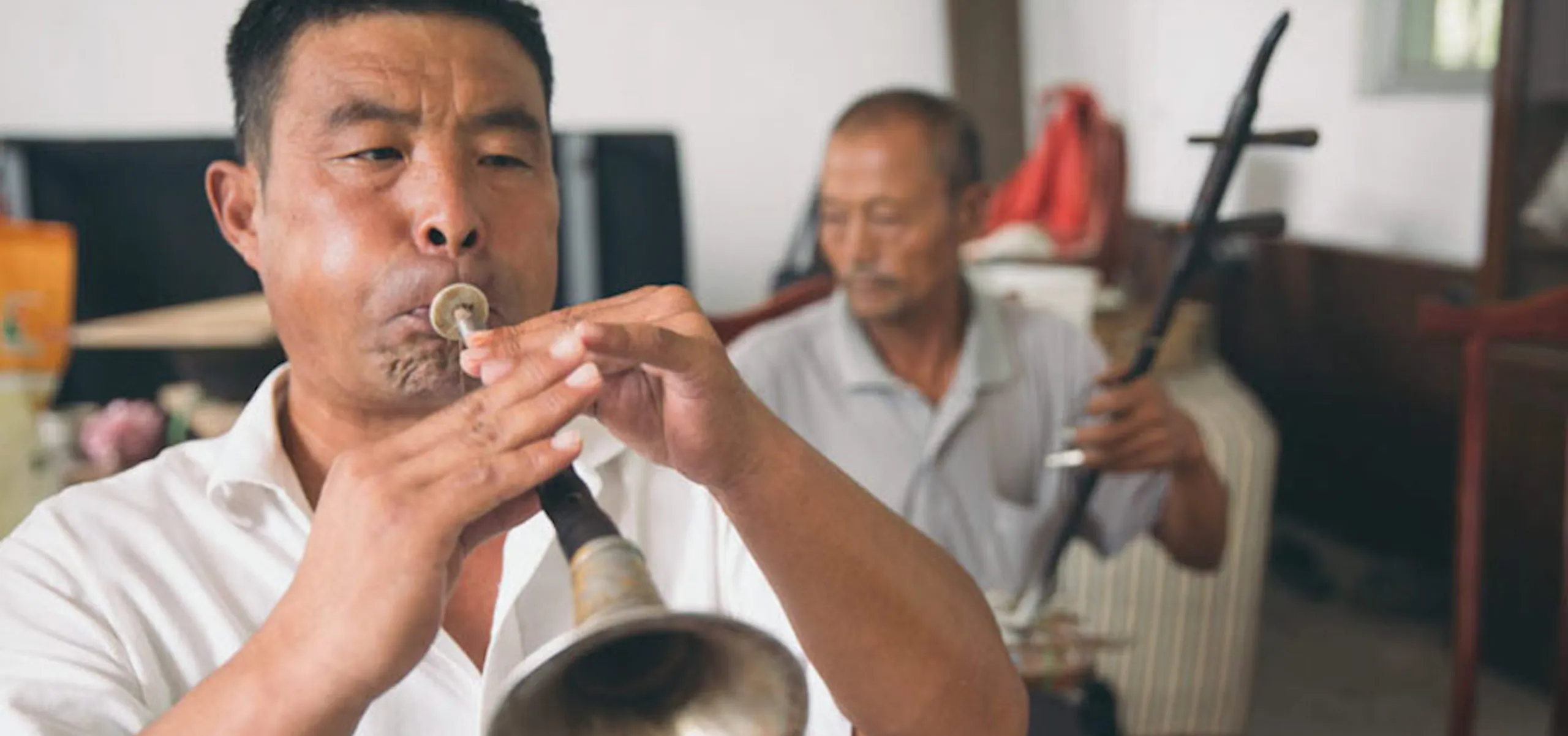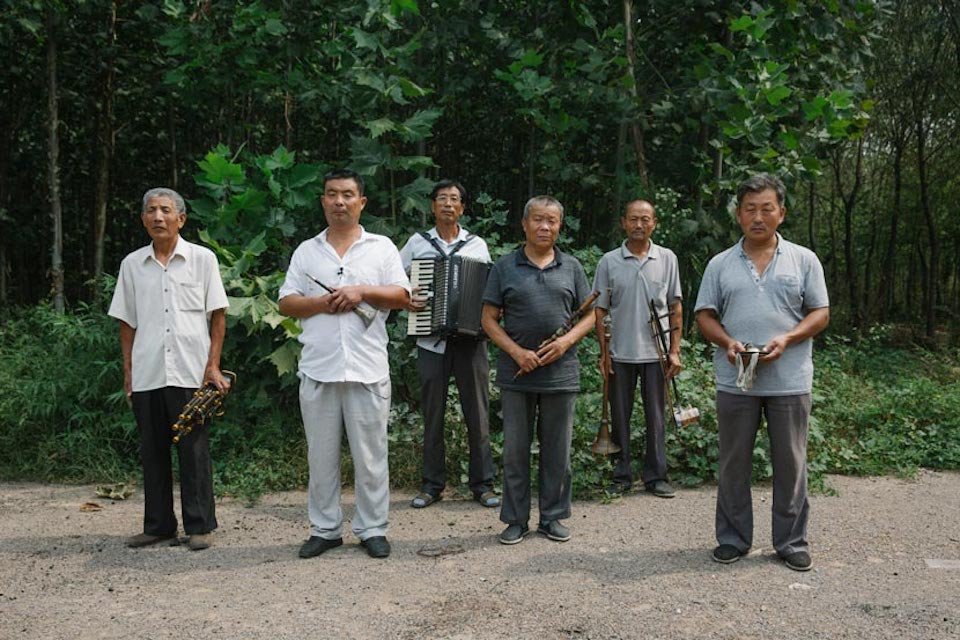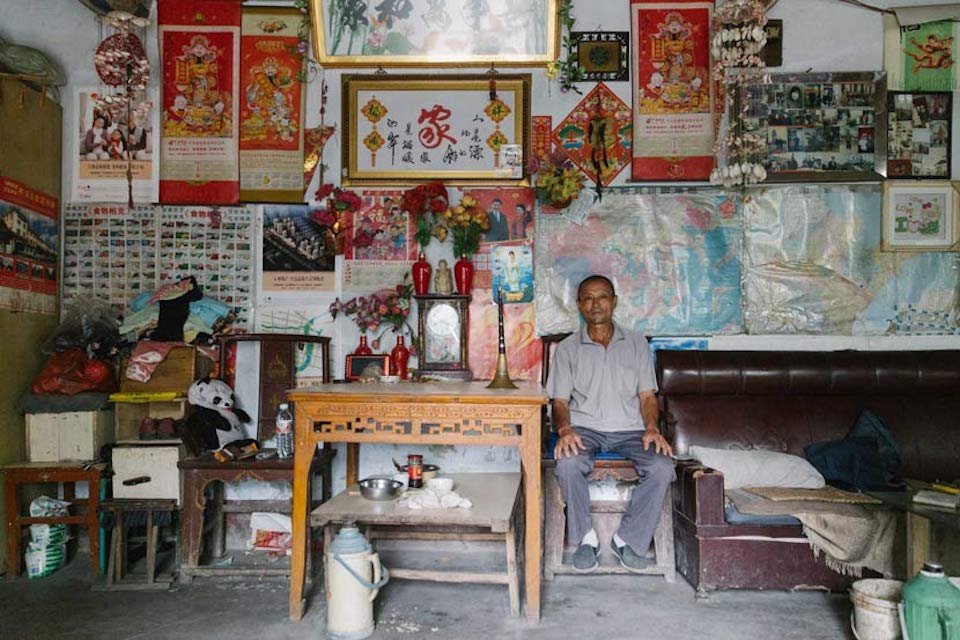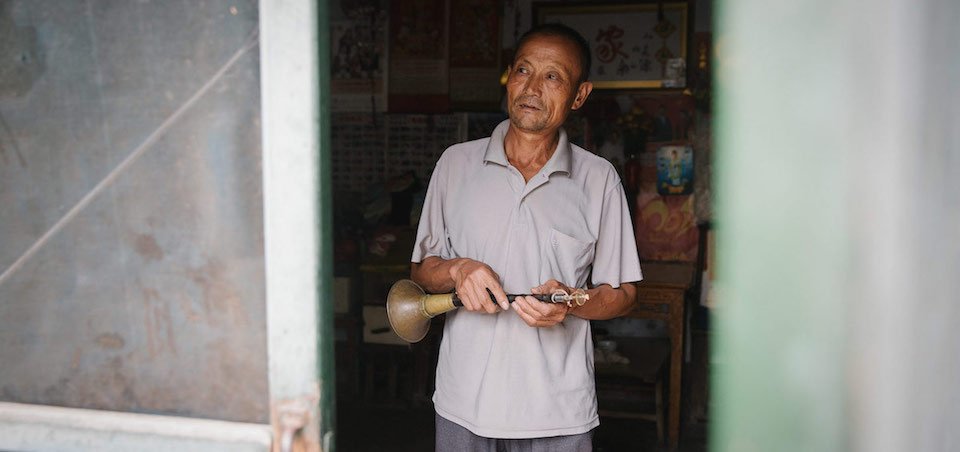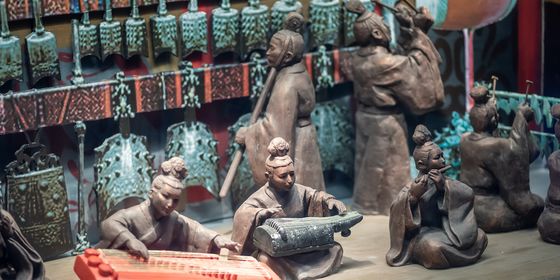Banned by local government, the music that traditionally accompanies northeastern funerals could itself be on the brink of death.
This story was originally published on Sixth Tone and has been republished with permission as part of our collaboration with Sixth Tone X, a platform featuring stories from respected Chinese media outlets.
SHANDONG, East China — The unmistakable wail of the suona pierces the dusk in the village as Wang Ruiyong plays a traditional tune on the double-reed instrument. The elderly funeral attendees approve, recognizing the melody. Yet for nearly five years now, Wang and other suona masters have been recording their repertoire in the fear that the songs could soon be forgotten as their tradition increasingly comes under threat.
The suona is a traditional Chinese wind instrument similar to the oboe that is customarily played alongside gongs, drums, and the sheng mouth organ at weddings and funerals in rural northeastern China. In Shandong province, where the suona is sometimes known by the onomatopoeic name “wulawa,” the instrument is an integral part of traditional culture. But in Shandong’s Pingyi County, where Wang hails from, suona performances have been banned from funerals since October 2016 as part of local government reforms aiming to curb lavish, showy ceremonies.
Elaborate and sometimes outrageous funeral services featuring everything from strippers to the burning of ghost money drew the attention of international media and local authorities in 2015, but now, even the suona has been caught in the crossfire. In November 2016, 21 professors from prominent institutions like Peking University signed a public appeal for the protection of village funeral traditions, saying that the government reforms ought to allow folk customs in keeping with cultural revival and only forbid extravagant vices such as stripping.
To performers, the suona has unfairly taken the blame for other, more vulgar, funeral practices. Wang believes the reforms have only crushed suona music and firecrackers because noise easily draws officials’ attention. Earlier this year, the Pingyi County government announced it would confiscate musical instruments played at funerals. When Wang and other suona masters performed at the funeral of an esteemed elder in June, village officials barged in and caused a commotion. The suona was small enough to be quickly hidden, but bigger instruments were snatched away.
“We’re not thieves, and the suona is not a weapon,” Wang argues. He is still incensed when he recalls the conflict, which he says so angered one suona player that he went home and burned his instruments.
For Wang, suona music runs in his blood. Yet even with four generations of suona players among his forebears, it took him years of practice to master even the basics on the notoriously difficult instrument. As a child, he spent months playing cymbals in his grandfather’s band to improve his sense of rhythm. Then, from the age of 8, he started learning the sheng mouth organ to perfect his intonation and dropped out of school to focus on music.
Finally, at 15, Wang’s grandfather allowed him to start his suona training. In addition to practicing on the instrument, every day, he was to blow through a hollow reed into a basin of water to improve his breathing technique. At first, he couldn’t even make bubbles. After a year of practicing for hours each day, his grandfather gave him his first performance opportunity — but stage fright got the best of him.
Now 47 years old, Wang has been playing the suona for most of his life. But the role of a suona musician has changed dramatically since the 1980s, when Wang remembers that his grandfather’s band would be booked out months in advance. These days, Wang works in construction between gigs to make ends meet.
The recent reforms are not the first time the suona has been subject to the twists and turns of public policy. In the early days after the Communist victory in 1949, Wang’s family band played the suona not only at weddings and funerals but also at state ceremonies for sending recruits off to military service or starting construction on reservoir projects. Suona music was the soundtrack to every important moment. But during the Great Chinese Famine, no one could afford to hire musicians, and the suona was later blacklisted as part of Cultural Revolution campaigns against Confucian heritage. It wasn’t until the reform and opening-up era in the ’80s that the suona was restored to its central role in northeastern culture.
As a teenager in the 1980s, Wang would play several gigs a day with his grandfather’s band. Everywhere they performed, they were served tea and tobacco and treated as honored guests. But after the arrival of the new millennium, the popularity of suona music declined. The market for musicians shrank as newlyweds turned to new trends: Western rock bands, pop singers, folk operas. The suona became passé, even maudlin. “Once the suona sounded, people would think someone must have passed away,” Wang explains.
After Wang took over his grandfather’s band in 2007, he felt immense pressure to sustain the reputation and tradition he had inherited, but prospective clients kept asking for new instruments and styles of music. Eventually, Wang caved, learning the electric keyboard and trumpet and recruiting an opera singer. But work continued to dry up, and Wang now often plays with other bands that have navigated the market more shrewdly.
The most successful band in Pingyi County is headed by 29-year-old Liu Ji. In jeans and a tight white T-shirt, with a gleaming stud in his ear, Liu looks the perfect antithesis of Wang, the traditionalist in gray trousers and a loose white shirt. Yet Liu, too, learned to play the suona with a reed and a water basin, he says, practicing through hot summer days until the sweat from his feet soaked prints into the ground. He, too, inherited his band from his family, but he added young acrobats, dancers, singers, and Western instruments.
“Whatever the customers want us to play, we can. Whatever they want us to sing, we can,” Liu says. “We have extensive equipment, including lights and sound effects.” With a diverse repertoire, his band has flourished while many others have floundered.
Though it has banned the suona from funerals, the local government has also paradoxically launched several initiatives to preserve the suona tradition. Since 2014, it has funded research and documentation of suona music, as well as an intangible cultural heritage protection plan that pairs around 15 masters with students. It also offers suona musicians performance opportunities. But according to Liu, the gigs are too few and too poorly compensated — some only pay 800 to 1,000 yuan ($120 to $150) for an eight-person band. He doesn’t believe that a state-sponsored imitation of the master-apprentice method will be able to sustain the tradition.
“The suona is hard to learn, and it is entwined with family and culture,” Liu says. “I think the way to pass down the suona [tradition] is to allow us to practice our cultural customs.”
Yet some young villagers share the government’s objections to suona funeral performances. To 27-year-old Dong Chengcheng, the funeral reforms are a positive step toward easing the burden on younger generations. “Although the price for booking a suona band is not such a big deal, it still costs money,” he explains. With each funeral typically requiring three days of ceremonies and banquets, the expenses add up — especially as family planning policies have left today’s young people with fewer siblings to share the costs.
“All the complicated stuff for funerals that takes time and money should be scaled down, including suona performances,” Dong asserts. But Wang says that while he understands the younger man’s feelings, other elaborate customs persist.
Li Bingxiang, a suona fan and former Party secretary of a village in Pingyi County, also believes the instrument has fallen victim to the wide net cast to prevent ostentatious funerals. “The main extravagant expenses are the banquet, coffin, and labor costs for a three-day ceremony,” Li says. “There should be a compromise that reaches the government’s goals but also preserves traditions.”
Not a peep has been heard from the local government on suona music since the ban took effect, though officials did return the confiscated instruments in the end. Most suona players have started to take on other jobs — some in local glove-making factories, others beyond the county.
“It’s quite hard for us to find jobs,” Wang says. “We’re not young, and we don’t have other skills.” When he first started doing short-term construction work earlier this year, he didn’t even know how to mix concrete, but other workers were friendly and helped teach him the basics. He doesn’t mind the labor, though it leaves him sore. He feels his cheeks are stiff after days away from the suona — a reminder that he was once a master musician.
Despite the instrument’s elegiac associations, Wang says it never felt mournful to him. “I didn’t feel sad until I wasn’t allowed to play,” he says.
Editor: Qian Jinghua.
(Header image: Guo Jihua, a 62-year-old ‘suona’ master, holds his instrument at home in Pingyi County, Shandong province, Sept. 15, 2017. Wu Huiyuan/Sixth Tone)





